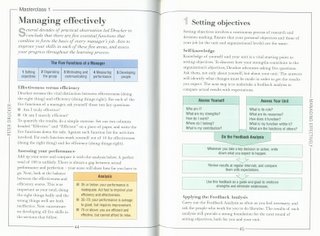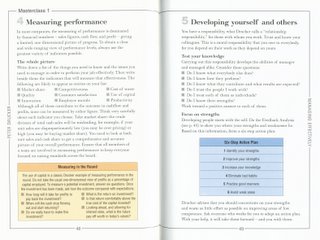Some of the blogs I follow have been talking about Peter Drucker, who quite recently died. I actually had checked out a couple of books from the library on him, including the Nonprofit Management one, which I haven't gotten too quite yet. However, I did read Robert Heller's treatment, published by DK press, called Peter Drucker: The Great Pioneer of Management Theory and Practice.
For me, the book was an exceptional introduction to Drucker's work, with which I hadn't been familiar since my degree isn't in management. Turns out that Drucker was light years ahead of his time, at least from my nonspecialist perspective. Everything that people are saying now about "marketing is about relationships," etc., Drucker was saying way back in his career. Additionally, another bit of keen foresight was his focus on "self-governing community," as the ideal in management systems. (This was, I believe, a long time before anyone was using the term "knowledge worker".)
Of course, one thing this overview spends time on is Drucker's trick of measuring everything. This makes sense, especially given Drucker's overall raison-d'être of proving that management is a distinct discipline. It seems that everyone in my small nonprofit world has glommed on to the measurement trick, however, without really ever doing it. Everybody wants to say they are measuring stuff but in reality, does it happen? If it did, I think that nonprofits would be more successful. His ideas are definitely useful.
Just one more plug for the actual book, it has this really useful "master class" section , that diagrams concepts in a very user-friendly way. Here is one of them.


 I actually really like this whole series, so I will likely read the other books on Warren Buffett and Bill Gates.
I actually really like this whole series, so I will likely read the other books on Warren Buffett and Bill Gates.
By Robert Heller
ISBN # 0789451581
For me, the book was an exceptional introduction to Drucker's work, with which I hadn't been familiar since my degree isn't in management. Turns out that Drucker was light years ahead of his time, at least from my nonspecialist perspective. Everything that people are saying now about "marketing is about relationships," etc., Drucker was saying way back in his career. Additionally, another bit of keen foresight was his focus on "self-governing community," as the ideal in management systems. (This was, I believe, a long time before anyone was using the term "knowledge worker".)
Of course, one thing this overview spends time on is Drucker's trick of measuring everything. This makes sense, especially given Drucker's overall raison-d'être of proving that management is a distinct discipline. It seems that everyone in my small nonprofit world has glommed on to the measurement trick, however, without really ever doing it. Everybody wants to say they are measuring stuff but in reality, does it happen? If it did, I think that nonprofits would be more successful. His ideas are definitely useful.
Just one more plug for the actual book, it has this really useful "master class" section , that diagrams concepts in a very user-friendly way. Here is one of them.


 I actually really like this whole series, so I will likely read the other books on Warren Buffett and Bill Gates.
I actually really like this whole series, so I will likely read the other books on Warren Buffett and Bill Gates.By Robert Heller
ISBN # 0789451581